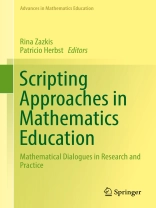This book shows how the practice of script writing can be used both as a pedagogical approach and as a research tool in mathematics education. It provides an opportunity for script-writers to articulate their mathematical arguments and/or their pedagogical approaches. It further provides researchers with a corpus of narratives that can be analyzed using a variety of theoretical perspectives.
Various chapters argue for the use of dialogical method and highlight its benefits and special features. The chapters examine both “low tech” implementations as well as the use of a technological platform, Lesson Sketch. The chapters present results of and insights from several recent studies, which utilized scripting in mathematics education research and practice.
Daftar Isi
On Dialogue and Stories as Representations of Practice: Introduction to the book, Patricio Herbst.- Combining Geometrical Transformations: A meta-mathematical narrative, John Mason.- Constructing Plausible, but Uncommon Stories: Gaining subversive insight into the school mathematics tradition, Dan Chazan and Shoshana Gilead.- A Tale of Two Digital Games: How discussion can augment personal narratives, Anne Watson and John Mason.- Who is right? – What students’ and prospective teachers’ responses to scripted dialog reveal about their conceptions of proof, Orly Buchbinder.- Moving Toward Approximations of Practice in Teacher Professional Development: Learning to summarize a problem-based lesson, Gloriana González.- How Can Designed Reference Points in an Animated Classroom Story Support Teachers’ Study of Practice? Vu Minh Chieu, Wendy Rose Aaron, and Patricio Herbst.- “I understand” Talk in Script Writing: A case from Euclid’s Elements, Boris Koichu & Rina Zazkis.- Teachers Unpack Mathematical Conventions via Script-writing, Igor Kontorovich.- Interjecting Scripting Studies into a Mathematics Education Research Program: The case of zero-divisors and the zero-product property, Dov Zazkis and John Paul Cook.- Eyes, ears, and expectations: Scripting as a multi-lens tool, Ami Mamolo.- Generating, Appraising and Revising Representations of Mathematics Teaching with Prospective Teachers, Sandra Crespo.- Does the Medium Matter? A Comparison of Secondary Mathematics Preservice Teachers’ Representations of Practice Created in Text and Storyboarding Media, Annick Rougee and Patricio Herbst.- Preservice Teachers’ Learning Paths of Classroom Discourse through Scripting, Woong Lim, Deborah Roberts-Harris and Hee-Jeong Kim.- What Story Circles can do for Mathematics Teaching and Teacher Education, Patricio Herbst and A. Milewski.- Dialogues on Dialogues: The use of classical dialogues in mathematics teacher education, Rina Zazkis and Boris Koichu.- On the Use of Dialogues: Looking back and looking forward, Rina Zazkis.












